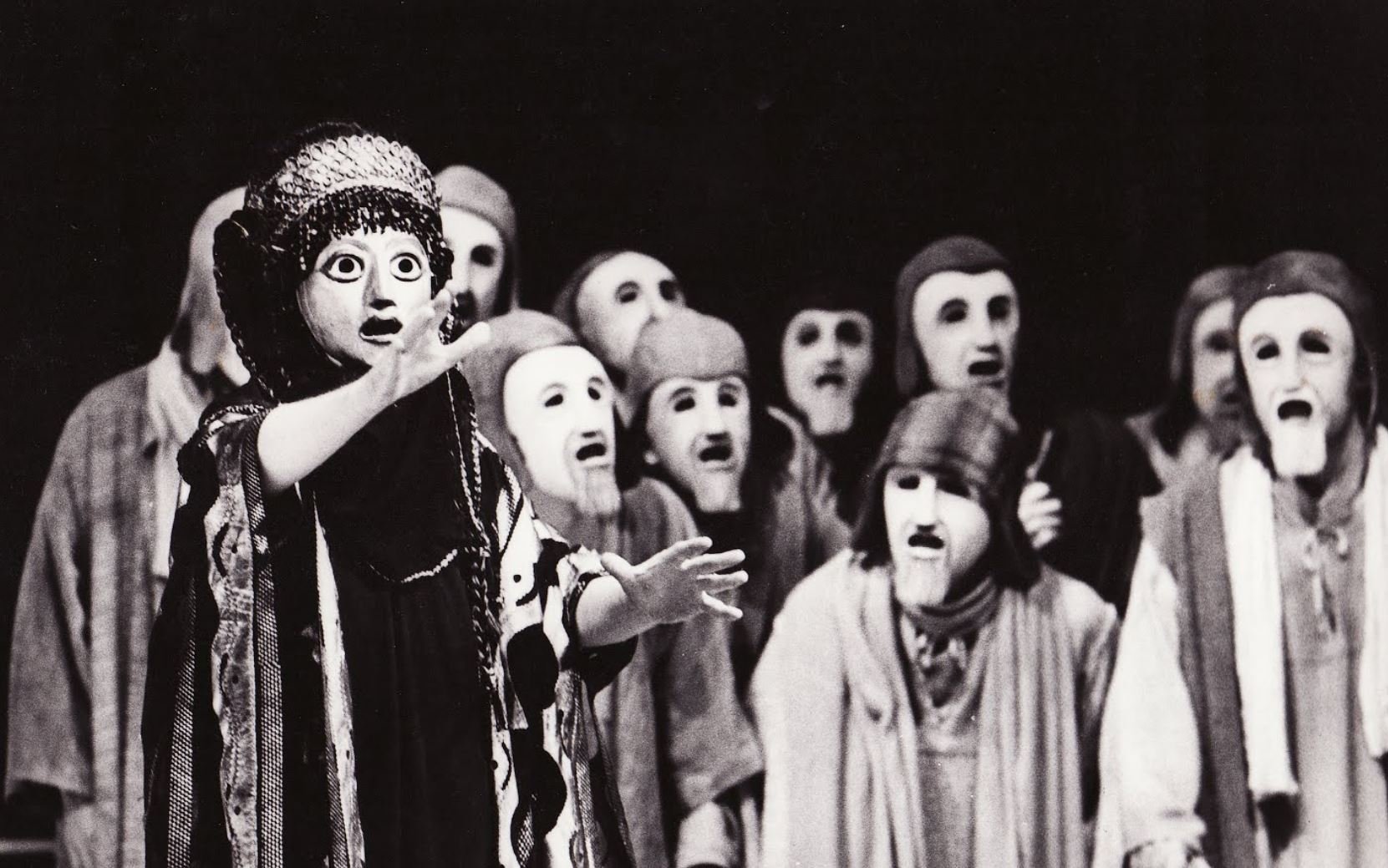By Maxwell Wilkens
In a typical Ancient Greek drama, the chorus is a group of performers who comment on the story from the sidelines throughout the play. But in the tragedy Agamemnon, written by ancient Greek playwright Aeschylus, the chorus made theatrical history by stepping into the action towards the end of the story, says UC Los Angeles classics professor Ella Haselswerdt.
At a climactic point in Agamemnon, the character Clytemnestra murders her husband, Agamemnon, and his concubine, Cassandra. Up until Cassandra’s murder, the chorus maintains distance from the play’s conflict. But after this moment, it springs into action, demanding that Clytemnestra be brought to justice, fulfilling a moralizing role.
“Near the end of the play, [the chorus] will abandon its removed position,” and “will enter the sphere of action and ethical responsibility,” Haselswerdt recently told a UC Santa Barbara audience.
UCLA Classics professor Ella Hasleswerdt said that the chorus from the tragedy Agamemnon experiences a dramatic transformation over the course of the play, unlike anything ever seen before in Greek theater.
The event was sponsored by the Classics department and was moderated by UCSB faculty member Emilio Capettini. It was co-sponsored by the Theater and Dance department.
At her lecture, Haselswerdt said the chorus in Agamemnon first feigns confusion about the plot, and then later makes confrontational statements, which transforms it from a bystander to a full-on participant within the play’s action. She said that this choral metamorphosis is “unparalleled” in surviving Greek tragedy.
Haselswerdt pointed out that odes – sung or spoken by the chorus – make up a large part of Agamemnon’s total run time. “Within the space of these odes, the forward progression of the plot is suspended, or sidelined, in favor of ruminations,” Haselswerdt said. “If we read the play’s narrative, dialogic passages as an account of waking life, we might read the odes as an associative dream space.”
The chorus even introduces itself as “a dream-vision wandering through the day,” which seems to confirm its role as far-away onlookers.
At the beginning of Agamemnon, the mythological king of Mycenae sails home at the end of a decade-long Trojan War. Agamemnon started the Trojan War by sacrificing his daughter Iphigenia, and so his wife Clytemnestra plots to kill him when she finds out that he has returned.
When Agamemnon first enters his palace and meets with Clytemnestra – who has taken a consort in his absence – the chorus anxiously shouts, “Why does this fear persistently hover about, standing in front of my prophetic heart? Whence comes this presaging song, unbidden, unhired?”
Haselswerdt said that this reaction from the chorus is surprising. “While the chorus here has not – as far as we know – specific knowledge of the impending murder, they know that Clytemnestra has taken a consort,” Haselswerdt said. “It seems strange that they would have such difficulty in identifying the cause of their anxiety.”
The only reason that the chorus might make such a statement is to establish its distance from the plot, Haselswerdt said. While the chorus members see the same things happening that the audience does, they choose not to understand it, and act aloof when they sense tension between Agamemnon and Clytemnestra.
The chorus’ relationship with the action is much different later in the play, when the audience learns that Agamemnon brought home a concubine from the war named Cassandra. When Clytemnestra moves to kill her husband, Cassandra tries to intervene and her final words pull at the heartstrings of the chorus.
The chorus from a 1981 production of Agamemnon, directed by Peter Hall. Towards the end of the tragedy, after the murder of Agamemnon and Cassandra, the chorus transforms from a bystander to a participant in the play’s action, demanding that the perpetrator be brought to justice.
“The chorus gains an understanding of the horrors that Cassandra communicates,” said Haselswerdt. “Once they have given themselves over to an understanding of the past, present, and future horrors of the house of Atrius – to the narrative of suffering – the chorus fundamentally shifts its mode of engagement with reality.”
After the death of Cassandra, the chorus finally stops feigning ignorance, and calls for ethical action, directly intervening in the plot. One member of the chorus says, “I tell you my advice: summon the townspeople to bring help here to the palace,” while another says, “to my thinking we must burst in and charge them with the deed while the sword is still dripping in their hands.”
Haselswerdt said that this moment is unique in the world of Greek drama. “We are here treated to an exchange unlike any other in extant tragedy, in which each of the members of the chorus is given his own opinion and lines to speak,” she said.
Haselswerdt looks forward to tackling the choral subject of other works in the future. “How might our perspective on tragedy shift if we were to privilege a play’s choral project over its plot?” she said.
Maxwell Wilkens is a third-year UC Santa Barbara student majoring in Communication and Music Studies. He is a Web and Social Media Intern for the Division of Humanities and Fine Arts.



